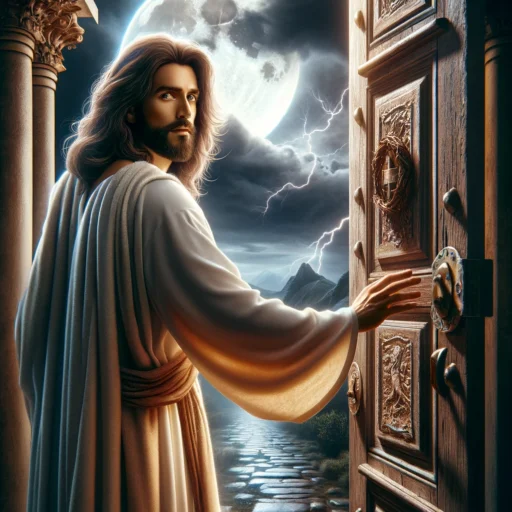Simply put, this is an allegory to drive the point home that those who love to be first in riches with the glory of man rather than in God will be last, in God’s sight and kingdom.
Sad to say, many have used this allegory to bolster support for the incorrect thought that people are still conscious after they die and go to either “heaven” or “hell,” receiving their reward, at that time. But they miss the point, along with the rest of God’s word that contradicts such teachings. So, taking into consideration that the bible says people are “asleep” and “unconscious” in death, what does this story really mean?
19 `And — a certain man was rich, and was clothed in purple and fine linen, making merry sumptuously every day,
20 and there was a certain poor man, by name Lazarus, who was laid at his porch, full of sores,
21 and desiring to be filled from the crumbs that are falling from the table of the rich man; yea, also the dogs, coming, were licking his sores.
22 `And it came to pass, that the poor man died, and that he was carried away by the messengers to the bosom of Abraham — and the rich man also died, and was buried;
23 and in the hades having lifted up his eyes, being in torments, he doth see Abraham afar off, and Lazarus in his bosom,
24 and having cried, he said, Father Abraham, deal kindly with me, and send Lazarus, that he may dip the tip of his finger in water, and may cool my tongue, because I am distressed in this flame.
25 `And Abraham said, Child, remember that thou did receive — thou — thy good things in thy life, and Lazarus in like manner the evil things, and now he is comforted, and thou art distressed;
26 and besides all these things, between us and you a great chasm is fixed, so that they who are willing to go over from hence unto you are not able, nor do they from thence to us pass through.
27 `And he said, I pray thee, then, father, that thou mayest send him to the house of my father,
28 for I have five brothers, so that he may thoroughly testify to them, that they also may not come to this place of torment.
29 `Abraham saith to him, They have Moses and the prophets, let them hear them;
30 and he said, No, father Abraham, but if any one from the dead may go unto them, they will reform.
31 And he said to him, If Moses and the prophets they do not hear, neither if one may rise out of the dead will they be persuaded.’
Young’s Literal Translation (YLT) uses the word “hades” in verse 23. This is the COMMON grave, dust. For God told Adam, “For dust you are and to dust you will return.” (Genesis 3:19) Both the righteous and wicked go there. Death is death. Those in death are conscious of nothing. They are “asleep,” in God’s eyes. Ecclesiastes 9:5,10; Lazarus’ account.
The “rich man” pictured here put his love for money and the glory of men first, more than for God. The rich man’s position, in death, is tormenting because there is no escaping or changing it. It could be viewed as a “burning,” unrelenting thought. Of course, there is no consciousness in death but we need to remember that this is an illustration. This “rich man” was probably directed especially at the religious leaders trying to trap Jesus (Luke 16:14-15). They loved riches and the glory of man that they brought. They, along with many people today, want to be first among men – Seeking the glory of man, rather than the glory of God. These ones who are first, will be last, in the incoming kingdom of God (Luke 18:9-14; Matthew 19:29-30; Matthew 20:25-28)
This figurative Lazarus does not selfishly seek riches or the glory of men but seeks God first. By so doing, this figurative Lazarus ends up having to endure hardship but ends up in a position to be greatly rewarded by God – And will be, upon the arrival of His kingdom.
The “bosom of Abraham,” in verse 22 and 23 is referring to the favored position in God’s sight – Not that he was carried to “heaven,” as some teach. Keep in mind that this story was told by Jesus before he died and ascended to heaven. Abraham, although dead, had not ascended to heaven. John 3:13 (RSV) states; “13 No one has ascended into heaven but he who descended from heaven, the Son of man.”
The “chasm” (verse 26) is the state of death. It is an unbreakable barrier by man. There is no consciousness in death. In death, a bad person can not do something to turn good and a good person can not do something to turn wicked. However, Daniel and Jesus spoke of a resurrection of both the righteous and unrighteous, once the kingdom of God begins ruling over earth (Daniel 12:1,2; John 5:28,29). Certainly, the righteous ones mentioned in these two passages, have a favored position with God, although dead, and they will reap their reward when they are resurrected. Just as Daniel was promised in Daniel 12:13(NIV); “As for you, go your way till the end. You will rest, and then at the end of the days you will rise to receive your allotted inheritance.” Daniel was not promised to receive his reward when he died but after he is resurrected, here on earth! Another “favored position” in God’s sight would be to have one’s name written in the “book of life,” as mentioned in multiple parts of the scriptures. An example is where Paul mentions some of who had labored with him, in the Lord’s work – That their names were written in the “book of life.” (Philippians 4:3)
